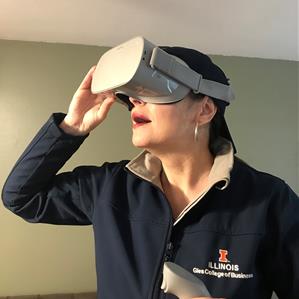
Apr 13, 2020 2020-04 Accountancy Faculty
Gies professor using virtual reality to make ‘tax’ less taxing for students
For many students, depreciation and cost recovery aren’t the most exciting concepts to learn, but now a professor at Gies College of Business has found a unique way to make learning about taxes fun.
Angel Chatterton is incorporating virtual reality to teach these important tax concepts. For her Principles of Taxation course, Chatterton is using VR to simulate a real life Airbnb. She and a team of three computer science and accounting students superimposed 360 degree GoPro pictures into a virtual reality headset and overlaid multiple choice questions, creating the VR Occulus Go Tax Project. Students can explore a room in the Airbnb, and they’re presented with questions about the proper tax classification for furniture, what is tax deductible, over what period of time is it tax deductible, and what is an expense?
 “The goal was to teach depreciation as an advisory experience using something that’s popular for students right now,” said Chatterton, senior instructor of accounting at Gies Business. “Airbnb is an experience that students use and book on a regular basis.”
“The goal was to teach depreciation as an advisory experience using something that’s popular for students right now,” said Chatterton, senior instructor of accounting at Gies Business. “Airbnb is an experience that students use and book on a regular basis.”
The virtual reality tax quiz, which is still in beta form, hasn’t yet been used broadly in a classroom setting. Chatterton began testing the virtual reality technology with students during her office hours. Soon it became so popular that she had to expand her office hours. “Eventually I started hanging out in commons areas, and people just kept stopping by,” she said.
Chatterton is continuing the culture of disruptive thinking at Gies. Faculty are constantly seeking ways to bring leading-edge technologies into the curriculum to better prepare students to become the business leaders of tomorrow. That outside-the-box thinking encompasses a wide variety of advancements that will complete reshape the business landscape. Through tools like virtual reality, Gies students have the opportunity to learn how technological innovations can move business forward and advance new ideas.
And it’s not just a fun teaching tool. Chatterton believes virtual reality can be extremely effective. Her virtual reality tax quiz meets the American Institute of Certified Public Accountants core competencies of technical skills, leadership skills, business skills, and people skills.
“Communication, project management, collaboration across disciplines, decision making, and leadership are critically important in today’s accounting discipline. It’s very important for our students today to be able to talk about accounting concepts to people who aren’t experts in the field,” she said. “Students who would never have considered taxation as a path before are now seeing it as an attractive option. They used to be intimidated by taxation. They felt it was boring and not useful. This project has totally changed the way they thought about it.”
“I think this visual technology can really help students gain better insight into how the materials they cover in class can be incorporated into the day-to-day lives of others,” said Jae Lee, a sophomore computer science major, who helped code the VR Occulus Go Tax Project. Lee estimates he spent about five to seven hours on programming per week for a little more than a semester. “I believe there is a lot of potential in using virtual reality for tax and accounting because many of those concepts are relevant to different parts of the world.”
“The use of VR helps visualize the application process and bring the tax codes to life,” said Nike Larasati, a senior accounting major at Gies. “It bridges the gap between textbook concepts and real-world scenarios.”
Chatterton is continuing to look for ways to enhance the virtual reality experience. Currently, the VR Occulus Go Tax Project allows users to only be in one spot. She wants to expand it so students can move around, pick up objects, and have more questions pop up. She also wants to incorporate automatic grading, expand the simulation to include a commercial business setting, and continue to improve the user experience for realism.
She and her students, like Lee and Lasarati, are conducting student surveys, professor interviews, and focus groups to analyze more ways VR can bring accounting education to life. One project in the works is a VR game, where the player is the manager of a doggie daycare. The player then performs daily duties to see their implication on the company’s financial statements. For example, when food runs out, it will affect the inventory account. When a dog bites a customer, it can raise liability issues.
“I think virtual reality is an effective way to convince students that taxation can be a great career to pursue,” she said. “VR is also a great tool to help communicate and show students they can talk to clients and potential business partners about tax issues without sounding like they’re reciting the tax code.”
